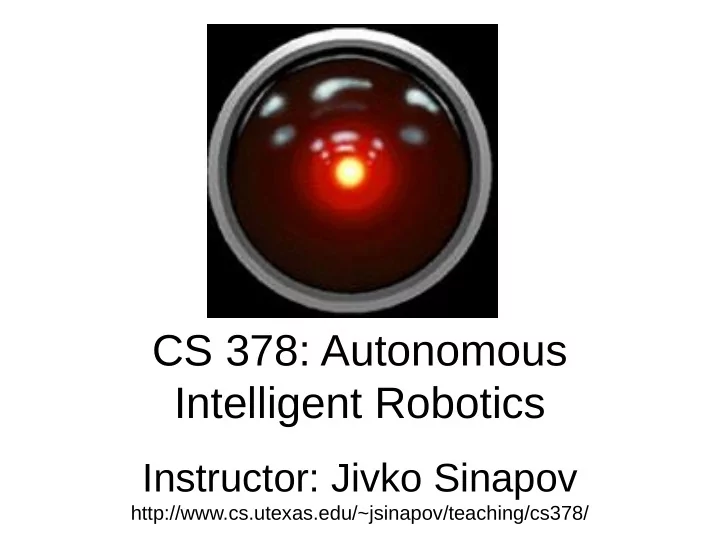

CS 378: Autonomous Intelligent Robotics Instructor: Jivko Sinapov http://www.cs.utexas.edu/~jsinapov/teaching/cs378/
Computer Vision: 2D Images
Announcements • Homework 5 deadline extended to this Thursday
Announcements Volunteers needed for another study! As before, there will be extra credit To sign up, email: – Rodolfo Rodriguez <rcorona@utexas.edu> – Jesse Thomason <thomason.jesse@gmail.com>
Final Project Timeline • Project Proposal due: Mar. 29 th Apr. 1 st • Project Presentations / Demos: Last Week of Class (May 3 rd and 5 th ) • Final Report due: May 11 th
Project Proposal Guidelines • Work in groups of 2-3 (it's OK to work on your own if you really want to) • Preferably, team up with people with different skills than yours • Purpose of the proposal is to give you an outline / roadmap
Project Proposal Guidelines • Each proposal should be about 2-3 pages • Each proposal should include: – What is the application / task / problem? – Any previous experience you may have in that area – What do you expect to achieve by the end of the semester? – How do you plan to evaluate whether it works or not? – A timeline / schedule of progress and milestones
Project Proposal Guidelines • Organization: your proposal should have sections and headings (don't just submit one long essay) • For example: – Introduction / problem formulation – Proposed approach / software – Proposed evaluation – Summary of anticipated end result
Project Ideas Vending Machine Sonar Sensor
Project Ideas Write ROS code to allow the robot to use an LED light strip
Project Ideas Help the robot “see” something it currently cannot Help the robot “hear” something (e.g., the elevator sound) Help the robot “do” something (e.g., follow a person)
Project Ideas
Project Ideas
Project Ideas
Project Ideas
Final Project Timeline The most important thing is to start early, and discuss your ideas with the TA, mentors and myself. We'll point you to a starting point, describe functionality that already exists, and help refine your ideas.
Final Project Timeline • Project Proposal due: Mar. 29 th Apr. 1 st • Project Presentations / Demos: Last Week of Class (May 3 rd and 5 th ) • Final Report due: May 11 th
Computer Vision: 2D Images
Readings • Jain, Kasturi, and Schunck (1995). Machine Vision, ``Chapter 1: Introduction,'' McGraw-Hill, pp. 1-24. • Jain, Kasturi, and Schunck (1995). Machine Vision, ``Chapter 2: Binary Image Processing,'' McGraw-Hill, pp. 25-72.
Readings (con't) • J. K. O'Regan and A. Noe, (2001). ``A sensorimotor account of vision and vis ual consciousness'' , Behavioral and Brain Sciences , 24(5), 939- 1011.
What is an image?
A grayscale image
An RGB image
How did computer vision start? In 1966, Marvin Minsky at MIT asked his undergraduate student Gerald Jay Sussman to “spend the summer linking a camera to a computer and getting the computer to describe what it saw”. We now know that the problem is slightly more difficult than that!
Computer vision vs human vision What we see What a computer sees
Intensity Levels • 2 • 32 • 64 • 128 • 256 (8 bits) • 512 • … • 4096 (12 bits)
Intensity Levels • 2 • 32 • 64 • 128 • 256 (8 bits) • 512 • … • 4096 (12 bits)
Image Plane v.s. Image Array [Jain, Kasturi, and Schunck (1995). Machine Vision, Ch. 1]
Point Operations [Jain, Kasturi, and Schunck (1995). Machine Vision, Ch. 1]
Local Operations [Jain, Kasturi, and Schunck (1995). Machine Vision, Ch. 1]
Global Operations [Jain, Kasturi, and Schunck (1995). Machine Vision, Ch. 1]
Thresholding an Image [Jain, Kasturi, and Schunck (1995). Machine Vision, Ch. 1]
Dark Image on a Light Background [Jain, Kasturi, and Schunck (1995). Machine Vision, Ch. 2]
Selecting a range of intensity values [Jain, Kasturi, and Schunck (1995). Machine Vision, Ch. 2]
Generalized Thresholding [Jain, Kasturi, and Schunck (1995). Machine Vision, Ch. 2]
Thresholding Example (1) [Jain, Kasturi, and Schunck (1995). Machine Vision, Ch. 2]
Thresholding Example (2) Original grayscale Image [Jain, Kasturi, and Schunck (1995). Machine Vision, Ch. 2]
[Jain, Kasturi, and Schunck (1995). Machine Vision, Ch. 2]
[Jain, Kasturi, and Schunck (1995). Machine Vision, Ch. 2]
Area of a Binary Image [Jain, Kasturi, and Schunck (1995). Machine Vision, Ch. 2]
This figure now becomes important [Jain, Kasturi, and Schunck (1995). Machine Vision, Ch. 1]
Calculating the Position of an Object [Jain, Kasturi, and Schunck (1995). Machine Vision, Ch. 2]
The center is given by [Jain, Kasturi, and Schunck (1995). Machine Vision, Ch. 2]
Horizontal and Vertical Projections [Jain, Kasturi, and Schunck (1995). Machine Vision, Ch. 2]
Horizontal and Vertical Projections [Jain, Kasturi, and Schunck (1995). Machine Vision, Ch. 2]
Projection Formulas [Jain, Kasturi, and Schunck (1995). Machine Vision, Ch. 2]
Diagonal Projection [Jain, Kasturi, and Schunck (1995). Machine Vision, Ch. 2]
The area and the position can be computed from the H and V projections [Jain, Kasturi, and Schunck (1995). Machine Vision, Ch. 2]
Neighbors and Connectivity
4-Connected [Jain, Kasturi, and Schunck (1995). Machine Vision, Ch. 2]
8-connected [Jain, Kasturi, and Schunck (1995). Machine Vision, Ch. 2]
Examples of Paths [Jain, Kasturi, and Schunck (1995). Machine Vision, Ch. 2]
Boundary, Interior, and Background [Jain, Kasturi, and Schunck (1995). Machine Vision, Ch. 2]
An Image (a) and Its Connected Components (b) [Jain, Kasturi, and Schunck (1995). Machine Vision, Ch. 2]
Color Perception
The RGB Color Space [http://www.arcsoft.com/images/topics/darkroom/what-is-color-space-RGB.jpg]
The RGB Color Space https://upload.wikimedia.org/wikipedia/commons/thumb/1/11/RGBCube_b.svg/2000px-RGBCube_b.svg.png
3D Scatter Plot for a patch of skin
The HSV Color Space
Color Detection and Segmentation
Color Detection and Segmentation
Discussion: how may we achieve this?
Example Hand Tracking using Color
Computer Vision in ROS
Computer Vision in ROS 1) Subscribing to an image topic 2) Converting a ROS image to an OpenCV image 3) Copy an image 4) Convert an image to grayscale 5) Access and set individual pixel values
Example Color Detection in ROS using OpenCV
Resources • OpenCV in ROS: – http://wiki.ros.org/vision_opencv – http://wiki.ros.org/cv_bridge/Tutorials – http://docs.opencv.org/2.4/doc/tutorials/tutorial s.html
THE END
Recommend
More recommend